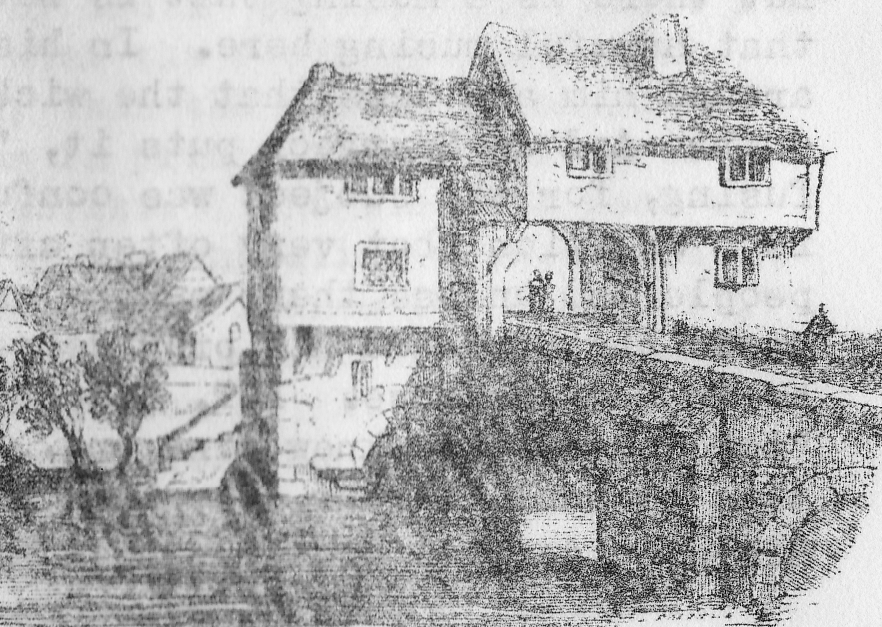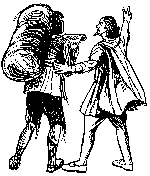
The clash of the metal of warfare is never very far away from the lines of this three-hundred year old hymn, as, indeed, the author himself was no stranger to that battlefield that the Lord often calls His children to enter in the defence of His truth, John Bunyan spent twelve years in Bedford jail for his non-conformity, but it was during that time, in the mysterious Providence of God, that he wrote his famous Pilgrim's Progress in which this battle-hymn of non-conformity appears. The lines of the hymn are placed on the lips of one of the great characters of the book – Mr Valiant-for-the-truth; and we would make so bold as to assert that it is only those who have "shed some blood" in the defence of the gospel of redeeming grace that have any right to join their voices with Bunyan's steadfast warrior in echoing the sentiments that are here fall from his lips.
Valiant-for-truth, of course, can be Bunyan himself, as can Hopeful and Mr Ready-to-halt and Trust and Old Honest. It is the Pilgrim's Progress, and Bunyan himself is a pilgrim on his way to the heavenly City. Not only are the characters of the book characters that the Pilgrim meets on his journey to that blessed place, but they are characteristics that the heaven-bound pilgrim faces in his own heart as he enters the strait gate walks the narrow way. Valiant-for-truth, then, is Bunyan himself, thrust into the heavenly conflict, yet worthy to sin the praises of the great captain of his Salvation whom he has seen fly to his side and teach his hands to war as He upholds him in the heat of the day in that Bedfordian prison-house.
It is Mr Greatheart who invites these words of resolute refusal to compromise from Bunyan's Christian soldier. Greatheart has just come to the foot of Dark Lane and, as he arrives there, we are told, he finds a man standing "…with his sword drawn, and his face all blood." "Who art thou?" Greatheart asks the man. "I am one of whose name is Valiant-for-truth," comes the reply, "I am a pilgrim, and going to the Celestial City." He begins to tell Greatheart how he had been attacked by three men who had tried to turn him away from his pilgrimage, but he had fought with them, as he says, "for the space of above three hours. They have left their mark upon me, as you can see," he tells Greatheart, "some of the marks of their valour, and have also carried with them some of mine; but they are now fled.
"But here was great odds," says Greatheart, "three against one," "Tis true," says Valiant-for-truth, "but little or more are nothing to him that the truth on his side … I fought till my sword did cleave to my hand, and then they were joined together, as if a sword grew out of my arm, and when the blood ran through my fingers, then I fought with most courage … … …
"Who would true valour see,
Let him come hither;
One here will constants be,
Come wind, come weather;
There's no discouragement
Shall make him one relent
His first avowed intent
To be a pilgrim."
And should we ask the reason why Mr Valiant-for-truth fought "for the space of above three hours," and used his sword until the blood ran through his fingers and the weapon cleaved to his hand, then, the answer is contained in this, that he was fighting for the gospel that had saved his soul. "I am of Dark Land," he tells his new-found friend, "for there was I born and there my father and mother are yet." But he had been called out of Dark Land, he goes on to say, by one Mr Tell-truth. It was the truth, don't you see, that had called him out of nature's darkness and had set his feet on the pilgrim path to glory and so, he would stand against "great odds" – aye, against All odds, to fight for that truth.
The hymn belongs to the spiritual soldier, my brethren. To that man, or that woman, or that young person who has not only said "Set down my name, sir," as they have enlisted in the army of the Lord, but are prepared to take up arms against every sea of trouble that would threaten the well-being of the truth of their redemption's story. Would to God we would see a generation of believers who could hurl forth such an invitation as this with a clear conscience before all men –
"Who would true valour see,
Let him come hither."
Now, of course, John Bunyan, like all his Puritan bred, was absolutely practical in every application of redeeming truth to our hearts. The heat of the battle can be a comparatively easy position when set along side those thought of desolation that arise in our hearts when it appears to the "natural" eye that the enemy has won the day and that the voice of defeat is already ringing in our ears. But Bunyan seems to offer one strange antidote for this aspect of battle, and it is this –
"…a right
To be a Pilgrim."
"Whoso beset him round
With dismal stories,
Do but themselves confound;
His strength the more is.
No lion can him fright,
He'll with a giant fight,
But he will have a right
To be a pilgrim."
Bunyan was no mere theoretical soldier; he had been faced with manys a "dismal story" and had been afflicted by those "dismal" aspects of our Christianity that don't seem to have much currency in our present-day evangelical gospel. But, where do we find a more desolate and pathetic scene than that time when our author is being separated from wife and children to be led away "the prisoner of Jesus Christ" at Bedford jail? He didn't want to go from them, because, as he says in his  Grace Abounding to the Chief of Sinners, "… I should have often brought to my mind the many hardships, miseries, and wants that my poor family was like to meet with, should I be taken from them, especially my poor blind child, who lay nearer my heart than all besides." That little one, who had never seen her father in the flesh and now, would also be deprived of his tender presence in her life. That was a "dismal story." And the Castle called "Doubting" was not unfamiliar to Bunyan, neither was its great hulking occupant, Giant Despair. And yet, from these very things he'll draw his power to fight, both with "lions" and with "giants", for this is part of "his right to be a pilgrim." In scriptural terms the doctrine reads like this: "I have chosen thee in the furnace of affliction" "Yea and all who shall live Godly in Christ Jesus shall suffer persecution." It's the very birth-right of the child of God to suffer, and he will know this birth-right the most keenly when he stands for that truth that has brought him to life in Christ.
Grace Abounding to the Chief of Sinners, "… I should have often brought to my mind the many hardships, miseries, and wants that my poor family was like to meet with, should I be taken from them, especially my poor blind child, who lay nearer my heart than all besides." That little one, who had never seen her father in the flesh and now, would also be deprived of his tender presence in her life. That was a "dismal story." And the Castle called "Doubting" was not unfamiliar to Bunyan, neither was its great hulking occupant, Giant Despair. And yet, from these very things he'll draw his power to fight, both with "lions" and with "giants", for this is part of "his right to be a pilgrim." In scriptural terms the doctrine reads like this: "I have chosen thee in the furnace of affliction" "Yea and all who shall live Godly in Christ Jesus shall suffer persecution." It's the very birth-right of the child of God to suffer, and he will know this birth-right the most keenly when he stands for that truth that has brought him to life in Christ.
Garrisoned again, then by this thought, Mr Valiant-for truth hurls out his challenge once again:
"Hobgoblin nor foul fiend
Can daunt his spirit;
He knows he at the end
Shall life inherit.
Then fancies fly away,
He'll care not what men say;
He'll labour night and day
To be a pilgrim."
Here is the great secret of running the Christian race, or fighting the Christian fight; we run, or fight, with the light of everlasting life in our eye, because everlasting life means life with Christ. Let a believer once get the light of heaven's glory into his heart and not all the powers of hell will turn him from the Christian conflict. For, he knows – although the battle may be sore at times
– "He knows he at the end
Shall life inherit."
Let all men rise up against him, He'll care not what men say," for in that great day when all the books are open, if he has stood in the defence of the glorious gospel of grace, he knows that he will receive the commendation that Valiant-for-truth received – "Thou has worthily behaved thy-self." What a "blessed indifference" that is to be indifferent to what men have to say once we have heard what God has had to say and he has said that he has called us to be "set for the defence of the gospel." "This was your victory, even your faith," said Greatheart again, "it was so, "said Valiant-for truth, "I believed, the therefore came out, got into the way, fought all that set themselves against me, and, my believing, am come to this place.
"Thou therefore endure hardness, as a good soldier of Jesus Christ. No man that warreth entangleth himself with the affairs of this life: that he may please him who hath called him to be a soldier." (2 Timothy chapter 2 verse 3)

This Page Title – "Who would true valour see" a hymn written by John Bunyan. The Wicket Gate Magazine "A Continuing Witness". Internet Edition number 72 – placed on line May 2008 Magazine web address – www.wicketgate.co.uk |